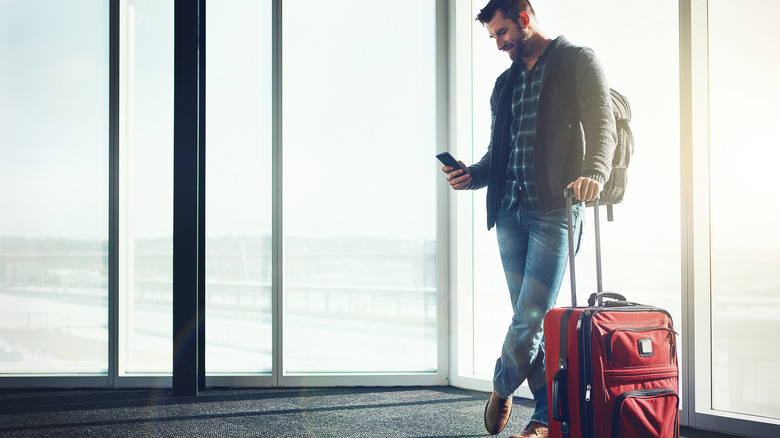The Unexpected Item That You Should Always Remember To Pack For Your Travels
You've looked everywhere, but you can't find your phone. You've ransacked your hotel room — pulled open drawers, thrown open closets, checked behind the dresser and under the mattress. But the truth is starting to dawn on you: Your phone is gone. You check the rental car, the front desk, and the museum you visited yesterday. There's no sign of it. Perhaps you dropped it down a sewer grate. Or maybe it was stolen.
Luckily, you prepared for this exact contingency by packing a second smartphone. The model is older, slower, and the camera is embarrassingly low-res, but it's something. Luckily, tourists using their phones overseas know that all you have to do is install a new SIM card and you're back in business. You can possibly even use this second phone to track or block your first phone, so even if it has fallen into the wrong hands, criminals can't break in and steal your data — a worst-case scenario that is all too possible.
Nowadays, more and more travelers are taking second phones with them on trips, especially when they travel internationally. A lost phone is inconvenient, of course, because we can't easily replace it in unfamiliar environments. But now that we rely on smartphones for communication, navigation, translation, banking, and two-factor identification, a lost phone can have debilitating effects on our travels and everyday lives.
A second phone is like insurance for the 21st century
"What's the big deal?" some might say. "Humans have traveled for thousands of years and never needed a smart phone. Sure it's an expensive gadget, but you'll just get a new one when you get home, right? Why freak out?"
First and foremost, losing your phone defies expectations. In addition to protecting your data and identity, it can be assumed that if people back home think you have your phone, and then you stop answering texts or FaceTime calls for days at a time, they will assume something is wrong. It becomes an even more stressful situation if you don't bring your laptop or other device. In the recent past, we could mitigate these concerns by visiting an Internet cafe and shooting off an explanatory email, but such cafes have mostly vanished. The same goes for many hotel business centers. Like pay phones, these services are going extinct, because everyone assumes you have a smartphone that can work anywhere. No matter how lightly you pack, the 21st-century traveler is more or less expected to bring a device.
The consequences could be even worse in places like China, where QR codes have almost entirely replaced cash and credit cards. Without a functional smartphone, a traveler can barely function in a city like Beijing, where cashiers rarely have enough cash to make change and swipers collect dust in the corner. However, it's a small comfort that it's still possible to travel without a smartphone in some parts of the world. Plus, digital fasting is a healthy exercise, especially on vacation. But you should always bring one for emergencies, and if possible, two. While you're sorting out your phone, here's one thing you should do before departing.

